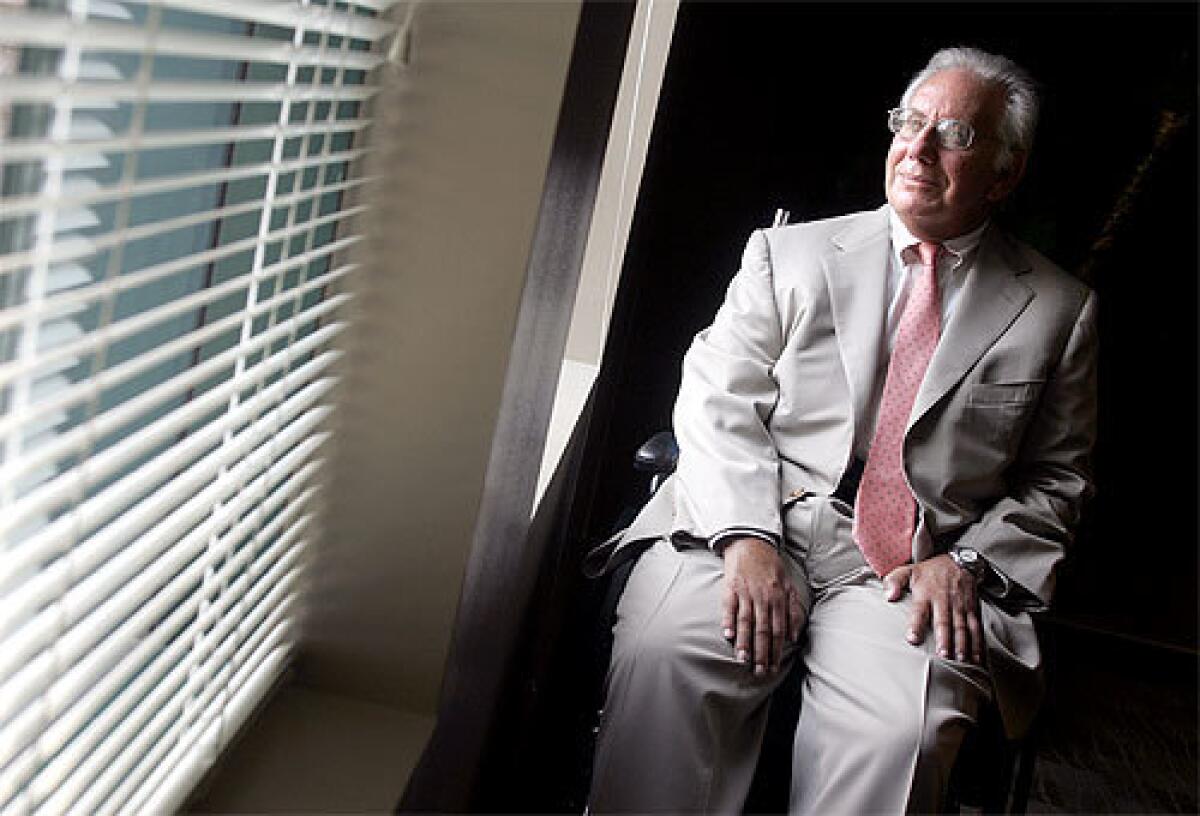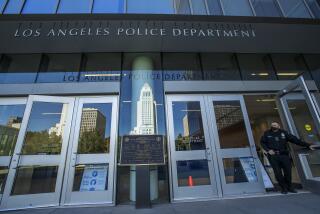Keeping the Thin Blue Line on Straight and Narrow

As a law student at the University of California’s volatile Berkeley campus in the 1970s, Merrick Bobb was once stopped by an angry Oakland cop and accused of intentionally driving his car toward the officer.
Bobb said he felt helpless under the officer’s accusation, which he strongly denied. He envisioned going to jail, his plans for a law degree destroyed. Then some Berkeley police officers approached and said they believed Bobb. They told him he was free to go.
“The discretion the police had stayed with me,” Bobb said. “They can be absolutely the best thing in your life — or your worst nightmare.”
Today, the 59-year-old Los Angeles lawyer is one of the nation’s leading authorities on police conduct. And his collegiate brush with police was one reason he took such an interest in law enforcement reform.
He served as a staff attorney for the Christopher Commission, which examined the Los Angeles Police Department’s policies after the 1991 beating of Rodney G. King. For the last 12 years he has been an independent monitor of the Los Angeles County Sheriff’s Department. Bobb’s organization, the Police Assessment Resource Center, also contracts to monitor and provide guidance to departments around the country.
Bobb has published 20 reports since 1993 about the Sheriff’s Department, tackling such issues as excessive force, officer-involved shootings and the dangers of chasing fleeing suspects.
One of his reports criticized the department for allowing a “cowboy” culture at its Century station, which he said had a disproportionate number of officer-involved shootings.
His findings tend to be sharply written and often suggest reform. His most recent report, released last week, faults the department for failing to aggressively pursue criminal charges against rogue deputies. One of his recommendations was for the department to set up “targeted stings,” in which undercover investigators attempt to catch deputies committing crimes.
Bobb also took issue with Dist. Atty. Steve Cooley’s office, saying it too often declines to prosecute cases of alleged police misconduct. That touched off a fiery defense from Cooley, who issued a public statement faulting Bobb for failing to recognize the high legal standard his prosecutors must meet and for failing to interview his prosecutors before publishing the report.
“Unlike Mr. Bobb and his staff, our attorneys are required by law to review all the evidence before making a determination on whether charges should be filed in any given case — be it against a civilian or a law enforcement officer,” Cooley said in the statement.
Roy Burns, president of the Assn. for Los Angeles Deputy Sheriffs, which represents more than 8,000 deputy sheriffs, has also taken issue with Bobb’s criticism.
The union published a response earlier this year to Bobb’s reports saying he needs more input from the deputies he criticizes.
Burns said he wants the Board of Supervisors, which pays Bobb and his staff $200,000 per year to monitor the department, to stop using him as a monitor. Instead, Burns wants a civilian review board with members who have law enforcement experience.
“His reports have been negative, not because they’re justified but simply to promote his longevity,” Burns said. “If you can’t find fault with our department then there would be no reason for his reports.”
County Supervisor Zev Yaroslavsky disagrees. “His job is not to be a defender of the bureaucracy of the department. His job is to challenge the department, to identify its weaknesses, magnify them in the hopes they’ll be corrected,” Yaroslavsky said. “He does that job.”
“Regardless of how much he gets under people’s skin, it has had a positive effect . You need somebody from outside the structure who is free to call them as he sees them.”
Bobb is soft-spoken and thoughtful. He uses a wheelchair because of Guillain-Barre syndrome, an autoimmune neurological condition that has left him unable to walk and limits the use of his arms. He was partially paralyzed two years ago, but he said his condition continues to improve.
Bobb cannot type, so he uses voice recognition software to write and edit his reports and to exchange e-mail.
But the disorder has done nothing to limit his interest in or desire to continue monitoring law-enforcement agencies.
“I enjoy the work tremendously. I found something I’m passionate about and fascinated by,” Bobb said during an interview in his 10th floor downtown office. “If I’m going to make a significant contribution during my lifetime it will be in this area.”
Asked how long he would like to continue this work, Bobb said, “forever.”
“I have tremendous empathy and respect for the individual police officer and the heavy responsibilities they bear,” Bobb said. “The overwhelming majority of police officers perform their jobs well. Nonetheless, the harm done by the few who are faithless to their trust is very substantial and can quickly erode the credibility of the department.”
Bobb said he believes his reports have led to improvements within the Sheriff’s Department. He cites the declining amount of money the county has had to pay out in settlements and judgments from lawsuits against deputies. According to the Sheriff’s Department, the county has paid millions of dollars less from such suits in the last two fiscal years.
“There is far less use of unnecessary force,” he said. “And the kind of force that’s being used are not the stomach-churning beatings that we saw in earlier times.”
The department now needs fine tuning, rather than a complete overhaul, Bobb said. He described his role as looking for “areas in which a very good law enforcement agency could be even better.”
It’s a job that he might not have tackled with such interest were it not for that experience three decades ago in Berkeley.
“My life could have taken a dramatically different turn,” Bobb said. “What if I had not been a white middle-class guy? What if I was an African American or Latino? Would I have been given the benefit of the doubt the Berkeley cops gave me?”
*
(BEGIN TEXT OF INFOBOX)
The watchman
Education: Bachelor’s degree in English, Dartmouth College; law degree, UC Berkeley’s Boalt Hall
Family:
Aviva Bobb, his former wife and college sweetheart at Berkeley, is a Los Angeles County Superior Court judge and remains “one of the most important people in my life.” They have two sons, Jonathan, 29, studying for his MBA at the University of Michigan; and Matthew, 24, who is working on his law degree at Michigan.More to Read
Sign up for Essential California
The most important California stories and recommendations in your inbox every morning.
You may occasionally receive promotional content from the Los Angeles Times.











